Related Research Articles

The Ulster Unionist Party (UUP) is a unionist political party in Northern Ireland. The party was founded as the Ulster Unionist Council in 1905, emerging from the Irish Unionist Alliance in Ulster. Under Edward Carson, it led unionist opposition to the Irish Home Rule movement. Following the partition of Ireland, it was the governing party of Northern Ireland between 1921 and 1972. It was supported by most unionist voters throughout the conflict known as the Troubles, during which time it was often referred to as the Official Unionist Party (OUP).

Ian Richard Kyle Paisley, Baron Bannside, was a loyalist politician and Protestant religious leader from Northern Ireland who served as leader of the Democratic Unionist Party (DUP) from 1971 to 2008 and First Minister of Northern Ireland from 2007 to 2008.

The Parliament of Northern Ireland was the home rule legislature of Northern Ireland, created under the Government of Ireland Act 1920, which sat from 7 June 1921 to 30 March 1972, when it was suspended because of its inability to restore order during The Troubles, resulting in the introduction of direct rule. It was abolished under the Northern Ireland Constitution Act 1973.

The Democratic Unionist Party (DUP) is a unionist, loyalist, British nationalist and national conservative political party in Northern Ireland. It was founded in 1971 during the Troubles by Ian Paisley, who led the party for the next 37 years. It is currently led by Gavin Robinson, who initially stepped in as an interim after the resignation of Jeffrey Donaldson. It is the second-largest party in the Northern Ireland Assembly, and won five seats in the House of Commons of the United Kingdom at the 2024 election. The party has been mostly described as right-wing and socially conservative, being anti-abortion and opposing same-sex marriage. The DUP sees itself as defending Britishness and Ulster Protestant culture against Irish nationalism and republicanism. It is also Eurosceptic and supported Brexit.
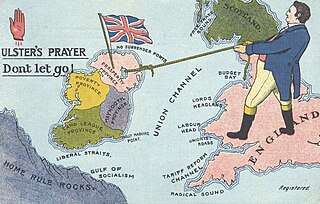
Unionism in Ireland is a political tradition that professes loyalty to the crown of the United Kingdom and to the union it represents with England, Scotland and Wales. The overwhelming sentiment of Ireland's Protestant minority, unionism mobilised in the decades following Catholic Emancipation in 1829 to oppose restoration of a separate Irish parliament. Since Partition in 1921, as Ulster unionism its goal has been to retain Northern Ireland as a devolved region within the United Kingdom and to resist the prospect of an all-Ireland republic. Within the framework of the 1998 Belfast Agreement, which concluded three decades of political violence, unionists have shared office with Irish nationalists in a reformed Northern Ireland Assembly. As of February 2024, they no longer do so as the larger faction: they serve in an executive with an Irish republican First Minister.

Terence Marne O'Neill, Baron O'Neill of the Maine, PC (NI), was the fourth prime minister of Northern Ireland and leader (1963–1969) of the Ulster Unionist Party (UUP). A moderate unionist who sought to reconcile sectarian divisions in Northern Ireland society and met with his counterpart in the Irish Republic, he was a member of the Parliament of Northern Ireland for the Bannside constituency from 1946 until his resignation in January 1970.

James Henry Molyneaux, Baron Molyneaux of Killead, KBE, PC, often known as Jim Molyneaux, was a unionist politician from Northern Ireland who served as leader of the Ulster Unionist Party (UUP) from 1979 to 1995, and as the Member of Parliament (MP) for South Antrim from 1970 to 1983, and later Lagan Valley from 1983 to 1997. An Orangeman, he was also Sovereign Grand Master of the Royal Black Institution from 1971 to 1995, and a leading member of the Conservative Monday Club.
The Protestant Unionist Party (PUP) was a unionist political party operating in Northern Ireland from 1966 to 1971. It was the forerunner of the Democratic Unionist Party (DUP) and emerged from the Ulster Protestant Action (UPA) movement. It was founded and led by Ian Paisley, who also founded and led the Free Presbyterian Church of Ulster.

James Hugh Allister is a Northern Irish politician and barrister who has served as Member of Parliament (MP) for North Antrim since the 2024 general election. He founded the Traditional Unionist Voice (TUV) in 2007 and has led the party since its formation. Prior to his election to Westminster, Allister was a member of the Legislative Assembly (MLA) for North Antrim, having been first elected in the 2011 Assembly election.

North Antrim is a parliamentary constituency in the United Kingdom House of Commons. The current MP is Jim Allister (TUV).

Belfast North is a parliamentary constituency in the United Kingdom House of Commons. The current MP is John Finucane.
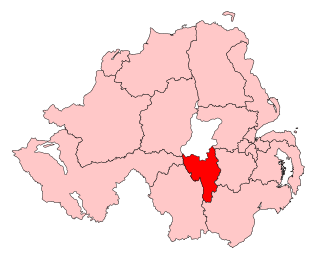
Upper Bann is a parliamentary constituency in Northern Ireland, which is represented in the United Kingdom House of Commons. The current MP is Carla Lockhart (DUP)
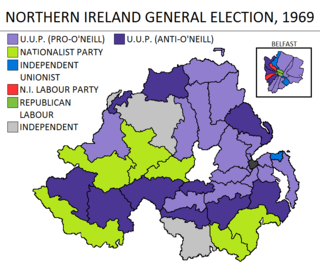
The 1969 Northern Ireland general election was held on Monday 24 February 1969. It was the last election to the Parliament of Northern Ireland before its abolition by the Northern Ireland Constitution Act 1973.
Sir John Lawson Ormrod Andrews was a member of both the Northern Ireland House of Commons and the Senate of Northern Ireland.
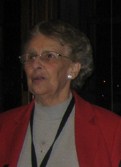
Eileen Emily Paisley, Baroness Paisley of St George's, Baroness Bannside, is a Northern Irish Unionist politician, a vice-president of the Democratic Unionist Party, and the widow of Ian Paisley, Lord Bannside, former leader of the DUP. She became a life peer in 2006. She retired from the House of Lords on 30 October 2017.
William John Beattie is Northern Irish former minister of religion and unionist politician who was deputy leader of the Democratic Unionist Party (DUP) from its foundation in 1971 until 1980.
Clifford Smyth is a Northern Irish historian and former unionist politician.
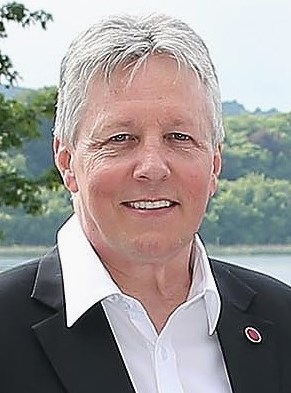
The 2010 United Kingdom general election in Northern Ireland occurred on 6 May 2010 and all 18 seats in Northern Ireland were contested. 1,169,184 people were eligible to vote, up 29,191 from the 2005 general election. 57.99% of eligible voters turned out, down 5.5 percentage points from the last general election.
The 1970 South Antrim by-election of 16 April 1970 resulted in the loss of a seat from the Ulster Unionist Party to the much smaller Protestant Unionist Party.